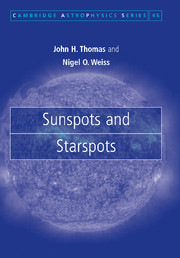Book contents
- Frontmatter
- Contents
- Preface
- 1 The Sun among the stars
- 2 Sunspots and starspots: a historical introduction
- 3 Overall structure of a sunspot
- 4 Fine structure of the umbra
- 5 Fine structure of the penumbra
- 6 Oscillations in sunspots
- 7 Sunspots and active regions
- 8 Magnetic activity in stars
- 9 Starspots
- 10 Solar and stellar activity cycles
- 11 Solar and stellar dynamos
- 12 Solar activity, space weather and climate change
- 13 The way ahead
- Appendix 1 Observing techniques for sunspots
- Appendix 2 Essentials of magnetohydrodynamic theory
- References
- Index
13 - The way ahead
Published online by Cambridge University Press: 28 October 2009
- Frontmatter
- Contents
- Preface
- 1 The Sun among the stars
- 2 Sunspots and starspots: a historical introduction
- 3 Overall structure of a sunspot
- 4 Fine structure of the umbra
- 5 Fine structure of the penumbra
- 6 Oscillations in sunspots
- 7 Sunspots and active regions
- 8 Magnetic activity in stars
- 9 Starspots
- 10 Solar and stellar activity cycles
- 11 Solar and stellar dynamos
- 12 Solar activity, space weather and climate change
- 13 The way ahead
- Appendix 1 Observing techniques for sunspots
- Appendix 2 Essentials of magnetohydrodynamic theory
- References
- Index
Summary
L'imagination …se lassera plutôt de concevoir que la nature de fournir.
Blaise Pascal (Pensées, 15° – 390)The many results that we have described amply demonstrate the rapidly accelerating rate of progress in our knowledge of the properties of sunspots and starspots, as well as the profound gaps in our understanding of some aspects of their behaviour. Our purpose in this concluding chapter is to identify the major unsolved problems involving the physics of sunspots, starspots and stellar magnetic activity, and to indicate those areas where we expect to see significant progress in the future, as techniques and facilities develop.
It is already apparent that solar observations, from the ground and from space, will continue to achieve higher resolution and increased precision. Meanwhile, stellar observations will attain greater resolution through improved spectroscopy and the introduction of interferometry, and stellar activity cycles will be followed using dedicated telescopes. Theory will also progress, depending not only on physical insight but also on the ever increasing power of high-performance computers, and the possibility of carrying out ever more realistic simulations.
13.1 The structure and dynamics of a sunspot
The Hinode satellite has only recently begun to deliver results, and will continue for a good many years, to be joined by the Solar Dynamics Orbiter in 2009. On the ground, the 1-m Swedish Solar Telescope will continue to provide important new results, and the 1.5-m German GREGOR solar telescope in Tenerife is due to become operational in 2008, to be followed in the USA by the 4-m Advanced Technology Solar Telescope in Hawaii by about 2014. These facilities will refine and extend our knowledge of the structure of a sunspot and the patterns of intensity, velocity and magnetic fields within it.
- Type
- Chapter
- Information
- Sunspots and Starspots , pp. 229 - 231Publisher: Cambridge University PressPrint publication year: 2008

